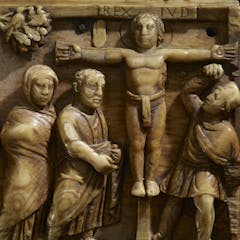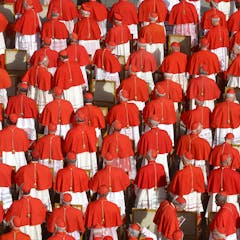
Articles on Roman Empire
Displaying 1 - 20 of 59 articles

Renaissance philosopher Niccolò Machiavelli dissected the threats authoritarian figures pose to representative government.

Each Easter we see many images of Jesus on the cross – inevitably wearing a loincloth. But the historical evidence shows victims of crucifixion were fully naked to maximise shame as well as pain.

Purple was highly valued and associated with royalty, power, and prestige in various ancient cultures, including the Roman and Byzantine Empires. So how did red creep its way in?

Fighting for voter access is an inevitable part of any democracy, from ancient Rome to the US today. Roman legislators were able to thwart elite political sway by introducing written ballots.

A spate of recent high-profile murders has put focus on the role of patriarchy and misogyny in persistent rates of anti-woman violence in Italy.

Historian and complexity scientist, Dan Hoyer, examines why past societies collapsed when faced with crisis, while others founds ways to survive and flourish.

A formidable woman born in the second half of the fourth century and widowed at around 17, Olympias was not afraid to advocate for herself – or her friends.

Nos Galan Gaeaf on October 31 in Wales is steeped in folklore and tradition.

The College of Cardinals is an important part of the church’s governance structure. Its members elect the next pope and help develop future policies for the church.

Following a number of films featuring debauched emperors, it is nowadays commonplace to associate the Greek-Roman antiquity with orgies. But is this historically accurate?

The ethnicity outcry says more about today’s preoccupations with race than ancient Egypt’s.

A historian of the late Roman world, who visited earthquake-devastated Antakya several times, writes about the city’s rich history and recovery after being devastated in the past.

Lucian’s work provides insight into the second-century Roman world, which fostered multilingualism and multiculturalism.

A scholar who studies biblical texts explains how the Bible, its laws, and ancient debates were set within a complex vision of society at that time.

Did ancient technological advancements drive social innovation, or vice versa? Studying cause and effect in the ancient world may seem like a fool’s errand, but researchers built a database to do just that.

Voices on the extremes don’t represent society.

The Atlantic slave trade isn’t Britain’s first brush with forced labour.

Some fringe conspiracy theorists are connecting COVID-19 vaccines to the mark of the beast. A religion scholar explains why the biblical reference should be considered in its first-century context.

Despite opposition from the early church, dance was an integral part of Christian devotion for many centuries before falling out of favor.

In early Christianity, soldiers could be baptized only if they refused to kill other human beings. While this changed over the years, tensions linger over Christian goals.
